Science education not fit for the future say majority of teachers

Only 46 per cent of educators believe that the science curriculum in their country prepares children for the future and a mere 31 per cent of teachers surveyed believe that science education in their country is adequate.
The Evolution of Science Education survey includes insights from 398 teachers in *22 countries and regions including Australia. While there are local nuances, there are also notable consistencies in key areas such as the science curriculum’s relevance in the future and how well it prepares pupils to navigate and address challenges like climate change and the evolving role of technology.
The research was undertaken alongside Oxford University Press’ active involvement in developing the science framework for the Programme for International Assessment (PISA) 2025.
Teachers were asked to recommend ways in which science curricula might evolve in order to remain relevant to today’s world, and that of tomorrow. Their recommendations included:
- Science education should continue to prioritize practical skills through experimentation in the classroom.
- Content needs to be up-to-date and prepare learners for the future.
- There is a need for a greater connection between the science that is being taught in the classroom and what is happening in the world outside.
- Teachers requested a rebalancing of exams – away from the current focus on knowledge, towards assessing the application of science.
Teachers surveyed believe the core purpose of science education should be inspiring learners to engage with science, teaching underpinning scientific concepts and teaching skills to enable effective experimentation.
There should be more focused on climate change as well as tackling fake news, and adapting faster to technological and societal change.
Andreas Schleicher, Director for Education and Skills, and Special Advisor on Education Policy to the Secretary-General at the Organization for Economic Co-operation and Development (OECD) said, “I always enjoy hearing teacher’s views on the future of education and welcome this report. The scientific challenges of the past year with the pandemic and the ever-growing signs of climate change mean that there has never been a more important time to focus on science, empowering students to thrive in a changing world. I look forward to continuing this conversation about the future of science education, particularly when we release the new PISA 2025 science framework next year.”
Australian science educator, Melinda Mestre, said, “It is widely recognised that for students to succeed beyond the classroom they need to develop skills such as problem-solving, critical and creative thinking, resilience, digital literacy and communication. We also need to be developing students who are becoming more independent in their learning. However, due to a crowded curriculum, there is little time to be developing these 21st century skills. Post-pandemic there is an opportunity to evolve how and what we teach. Science, as a field of study, is well placed to be developing these important skills in the classroom, as it is a subject based on inquiry and investigation.”
*Respondents were science teachers and educators from the following countries and regions: United Kingdom, India, Hong Kong, Pakistan, United States of America, Australia, Canada, Germany, Spain, Brazil, Italy, Mexico, New Zealand, United Arab Emirates, Estonia, Greece, Japan, Norway, Philippines, Portugal, Sweden, Thailand.
Photo by ThisIsEngineering from Pexels